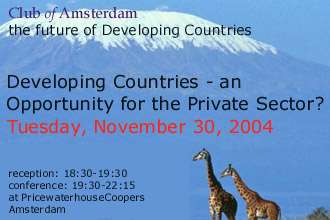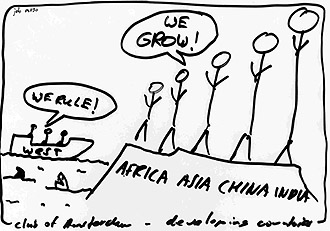Club of Amsterdam

Supporter
PricewaterhouseCoopers
SATORI

Illustration by Job Romijn
“Developing countries are no longer. Part of the former “Third World’ is in decay, struggling with governance crises, and economic deterioration. Other parts are rapidly becoming threats to US-dominated Empire, and to the European Union’s claims to become the world centre of innovation. Longer-term developments on a global scale will have to face further population growth, a rising demand for scarce resources on a world scale, the impact of climate change and vulnerability-increasing shocks. The economic and political tensions of the next fifty years will be dominated by the question: can the world develop a new governance regime for a globalised economy? Or will the world be confronted with regionalised block formation, in which hitherto ‘developing countries’ will become integrated in an American, a Eurafrican, a South-Asian and a Chinese block? What will be the position of obvious tension zones (Middle East, Indonesia)? Both regionalisation and globalisation will result in the gradual equalization of rewards for labour, first for educated labour, later for all forms of labour. A major mixing of labour streams, at global or regional levels can be expected, putting strong pressure on wage and salary levels in the hitherto ‘developed’ countries, and causing major social unrest.
Innovation capability will shift to high-tech, low-reward economies, but leaving large parts of the globe out, which will add governance problems to increased instability and fluidity. Areas of opportunities and areas of threats will exist side-by-side, and shift rapidly, undermining the necessity of long-term investments. New global governance is dramatically needed.” [![]() Prof. Dr. Ton Dietz]
Prof. Dr. Ton Dietz]
“Far from being disadvantaged sectors, traditional sectors such as textiles, food and fishing are being revolutionized by new technologies and have been transformed into dynamic activities. These so-called low-tech sectors now provide sources of comparative advantage for developing countries. Kenya’s export of cut flower makes up to 20% of its export revenue; and Uganda is a major exporter of fish and fish products to the European Union. Much of the dynamism has its source in technical and organizational innovations. In my short presentation, I will argue that innovation will be increasingly central to the competitiveness of African countries. However, explicit investment is required in reforming formal institutions as well as the norms, habits and practices of the key actors in Africa’s system of production and innovation including policy makers and political actors.” [![]() Prof. Banji Oyelaran-Oyeyinka]
Prof. Banji Oyelaran-Oyeyinka]
“The competitive winds are shifting from the west (Europe, USA) to the east and the south. China and India will be new economic superpowers in ten to twenty years. Outsource of bust.” [![]() Ton Lansink]
Ton Lansink]
19:30
Welcome by our Moderator Prof.dr. Jacques van der Gaag, Dean, Faculty of Economic Sciences and Econometrics, University of Amsterdam
Part I:
Prof. Dr. Ton Dietz, Professor of Human Geography, University of Amsterdam, Scientific Director, Netherlands Research School for Resource Studies for Development, CERES
Prof. Banji Oyelaran-Oyeyinka, United Nations University-Institute for New Technologies (UNU-INTECH)
Ton Lansink, Managing Director, Centre for The Promotion of Imports from Developing Countries
21:15
Part II: Panel with the Speakers and our Moderator Prof.dr. Jacques van der Gaag
The panel is followed by an open discussion.

Prof. Dr. Ton Dietz
Professor of Human Geography, University of Amsterdam
Scientific Director, Netherlands Research School for Resource Studies for Development, CERES
1974-1976: Junior Teaching Assistant, Dept. of Human Geography (1974-75) and Third World Centre (1976), Catholic University Nijmegen
1976-1982: Lecturer Dept. of Human Geography, University of Amsterdam (half time), 1976-1979 member of the editorial board of Zone, Dutch Radical Journal of Geography and Planning, 1976-1981 member of the board of the Indonesia Commitee
1982-1988: (Senior) Lecturer Dept. of Human Geography, University of Amsterdam (1982-83 full time, half of it paid by DGIS; 1983-85 half time; 1985-88 full time as senior lecturer)
1988-1995: Associate Professor (UHD) Dept. of Human Geography, University of Amsterdam1995-1998: Professor in Rural Environmental Geography of Tropics and Subtropics
1998-present: Professor in Human Geography, Dept. of Geography and Planning, University of Amsterdam
1993-present: Member of the directorate of the Research School for Resource Studies for Development, CERES
1997-2002: Director of the Amsterdam Research Institute for Global Issues and Development Studies
Scientific coordinator MHO NUFFIC project University of Amsterdam – Moi University School of Environmental Studies (1991-2003)
Scientific Coordinator, NOP Impact of Climate Change in Drylands (ICCD) research programme (1997-2002)
Chairman of International Geographical Union, section Netherlands (since 1999)
Member of the Board of ETC International (Ecology and Technology Consultants) Leusden (since 1995)
Member of the Board of the Netherlands Harambee Foundation for Health to support health care in West Pokot District, Kenya (since 1983)
AMIDSt is a major international centre for research in the areas of human geography, international development studies, and planning and spatial policies and belongs to the Faculty of Social and Behavioural Sciences of the Universiteit van Amsterdam.
http://www.fmg.uva.nl/amidst/home.cfm
http://ceres.fss.uu.nl/start.html

Prof. Banji Oyelaran-Oyeyinka
United Nations University-Institute for New Technologies (UNU-INTECH)
Prof. Oyeyinka joined UNU-INTECH in March 2001. Prior to that he worked as a Senior Economic Affairs officer at UNCTAD and Professor of Technology Management at the Nigerian Institute of Social and Economic Research, NISER in Ibadan, Nigeria. Prof. Oyeyinka’s university training is in chemical engineering and he has a Ph.D. in Technology, Management and Industrialisation Policy from SPRU, University of Sussex, UK in 1988. His research specialisation is information and communication technologies (ICTs), and small and medium enterprise (SME) clusters within innovation systems. He has published widely in the area of engineering, information technology and technological innovation and has also undertaken consultancies for a number of UN organisations including the UNECA, ILO, UNIDO, UNDP and UNCTAD. Prof. Oyeyinka is a founding member of the African Technology Policy Studies Network (ATPS) and he has coordinated a number of national projects in Nigeria, including the Industry and Technology Study Groups that developed Nigeria’s Vision 2010.
Prof. Oyeyinka has recently completed work on Africa’s Small and Medium Enterprises (and) Clusters and the New Competition. He is currently editing a manuscript (with Prof. Dorothy McCormick) on Innovation Systems and Innovative Clusters in Africa.
http://www.intech.unu.edu

Ton Lansink
Managing Director, Centre for The Promotion of Imports from Developing Countries
Born on September 11th, 1955 at Lichtenvoorde, The Netherlands. I’m married and have two sons. Obtained a Dutch University degree (drs, cum laude) in social and economic history and a teaching degree in economics in 1980.
Joined the Dutch Foreign Service and was posted to Egypt (1982), Iraq (1982-1984), India (1984-1987), the United States (1987-1989) and the Ministry of Foreign Affairs in The Netherlands (1989 onwards). Postings included political (Washington DC), commercial (Baghdad) and development related (New Delhi) functions. Was Head of the Training Division of the Ministry (1993-1996) and Head of the South Asia Department (1997-2002) dealing with the Dutch bilateral relations with the South Asian countries, including Afghanistan.
Managing Director of the Centre for The Promotion of Imports from Developing Countries (CBI). Joined CBI in the fall of 2002. Advisor on Trade and Development of Development Gateway (http://home.developmentgateway.org). Member of the Board of ASiA (Asia Studies in Amsterdam, http://go.to/asianstudies)
http://www.cbi.nl

Prof.dr. Jacques van der Gaag
Dean, Faculty of Economic Sciences and Econometrics, University of Amsterdam
http://www.fee.uva.nl

Adriaan Wagenaar
solo guitar
Founder, Satori
Have You Met Miss Jones?
Jazz standards and a fine blend of latin, on solo guitar by Adriaan Wagenaar. While having a drink, meeting people and reflecting on great ideas you can enjoy the guitar arrangements of ‘classics’ like Autumn Leaves, Caravan and My Romance and some Cuban folk songs.
Background
Adriaan’s roots are in the music of Bach, Piazolla, Sor and Villa Lobos. He followed masterclasses in baroque guitar and in Cuban jazz music. His approach of jazz standards is based upon the rich fingerstyle tradition of masters like Joe Pass and Charlie Byrd. Reflective, playful and with a sense of humour.
Adriaan is founder of Satori, a consultancy network for brand innovations. It encompasses , activities in the areas of developing innovative business cultures, futurology, brand positioning customer relationship marketing and organization strategy. He is a speaker and writer on subjects like: Children On Management, Future Scenarios For Sustainable Development, The Corporate Jazz Band.
http://www.satoristrategy.nl



Customer Reviews
Thanks for submitting your comment!